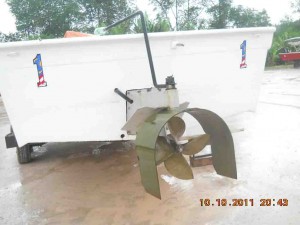Why don't boat props have some sort of cage around them? hardly add much drag, and gaps dont need to be really small.
Basically because water is incredibly complex stuff, being incompressible and all. The positioning of a propellor relative to the rest of the hull has a major effect on its efficiency, since the propellor works by imposing a force on the surrounding water in order to move the boat forward (which is why marine gearboxes, engine mounts and shaft bearings are often expensive -- they sometime have to withstand the entire mass of the boat). The theoretically best situation is for a propellor therefore to be positioned such that the flow of water over it is exactly parallel with its drive shaft. Anything which enhances this is good, and absolutely anything which impedes or causes additional turbulence in the flow would cost a lot in terms of horsepower transmitted to the surrounding water. The bars of any 'cage' would cause lots of interacting turbulence, including a "low-pressure" area directly behind each bar, as well as an increase in wetted surface (and therefore friction).
Given that most propellors are already positioned sub-optimally (since they are already in water which is disturbed by the passage of the forward part of the hull), it would only be worth fitting a cage in very specialist circumstances (dock workboats, for example). Open a cold tap fully, and put one finger under the stream to appreciate the effect -- it's not trivial.
However, outboard-powered inshore lifeboats often have a "prop guard" device fitted, which has the effect of stopping ropes, etc., being sucked in from the side (but not from in front), and additionally could theoretically make the engine more efficient, as there's a potential Venturi effect. The boat would have be very consistently operated, though, and the maths involved is probably horrendous if one needed to work out the benefits and losses. See:
http://propguard.net/how.html
One seriously interesting side effect of turbulence is that if a 'low-pressure' area is low enough, the water will boil at ambient temperature (just like when you make tea on a mountain -- you can't get the water hot enough before it boils without using a pressure vessel) This produces bubbles of vacuum in which the propellor will lose its grip, leading potentially to over-revving -- known as 'cavitation', and quite nasty as with many boats, you no longer have control at that point. As far as I understand it, it is this sort of thing that makes surface-piercing propellors so much more efficient:
There was also some very interesting and rather controversial stuff loosely based on a reversal of these principles by one James L Griggs, who produced a water heater for the fire station in Rome, Georgia (US) which produces 30 percent more heat in the water than the electricity used would normally allow. He seems to have invented a device which produces heat in water by inducing cavitation:
http://www.rexresearch.com/griggs/griggs.htm
This was the subject of a Channel 4 'Equinox' program about 10 years ago, and caused a bit of a stir, due the apparent breaking of various laws of physics (captain). Haha!
Why dont jet engines have cages in front of them?
Probably similar-ish reasons. But also: engines can take a certain amount of bird ingestion, but probably rather less metal mesh ingestion when something comes loose. Not good, especially if you're off the ground at the time.
Alexander - octopus has a greek root, so show-offs should really say 'octopodes'. 'Octopuses' is fine for the rest of us, though.
The current Greek noun for octopus is neuter, so the transliterated plural could be octopodia (from modern Greek) which is a much nicer word, and should be used on that basis alone. Probably.
Why do ministers in American churches talketh liketh this? Dost it maketh them more holy? Is thy holyeth spiriteth not as holeth if one does noteth?
If they didst have the faintest phukking clue with their grammar, they (mayhap) wouldst speak with many tongues and much gobbing. But do they not, oft-times, quote The Book?







